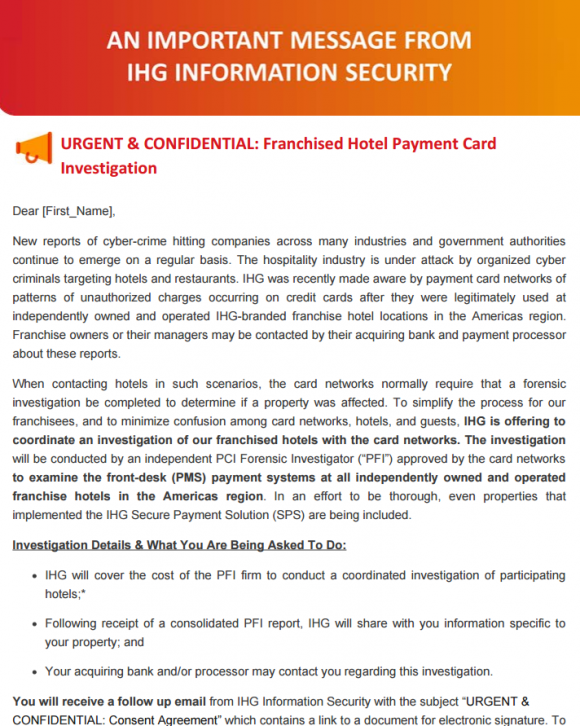InterContinental Hotel Chain Breach Expands
Credit to Author: BrianKrebs| Date: Wed, 19 Apr 2017 01:35:39 +0000
In December 2016, KrebsOnSecurity broke the news that fraud experts at various banks were seeing a pattern suggesting a widespread credit card breach across some 5,000 hotels worldwide owned by InterContinental Hotels Group (IHG). In February, IHG acknowledged a breach but said it appeared to involve only a dozen properties. Now, IHG has released data showing that cash registers at more than 1,000 of its properties were compromised with malicious software designed to siphon customer debit and credit card data.

An Intercontinental hotel in New York City.
Headquartered in Denham, U.K., IHG operates more than 5,000 hotels across nearly 100 countries. The company’s dozen brands include Holiday Inn, Holiday Inn Express, InterContinental, Kimpton Hotels, and Crowne Plaza.
According to a statement released by IHG, the investigation “identified signs of the operation of malware designed to access payment card data from cards used onsite at front desks at certain IHG-branded franchise hotel locations between September 29, 2016 and December 29, 2016.”
IHG didn’t say how many properties total were affected, although it has published a state-by-state lookup tool available here. I counted 28 in my hometown state of Virginia alone, California more than double that; Alabama almost the same number as Virginia. So north of 1,000 locations nationwide seems very likely.
IHG has been offering its franchised properties a free examination by an outside computer forensic team hired to look for signs of the same malware infestation known to have hit other properties. But not all property owners have been anxious to take the company up on that offer. As a consequence, there may be more breached hotel locations yet to be added to the state lookup tool.

A letter from IHG to franchise customers, offering to pay for the cyber forensics examination.
IHG franchises who accepted the security inspections were told they would receive a consolidated report sharing information specific to the property, and that “your acquiring bank and/or processor may contact you regarding this investigation.”
IHG also has been trying to steer franchised properties toward adopting its “secure payment solution” (SPS) that ensures cardholder data remains encrypted at all times and at every “hop” across the electronic transaction. According to IHG, properties that used its solution prior to the initial intrusion on Sept. 29, 2016 were not affected.
“Many more properties implemented SPS after September 29, 2016, and the implementation of SPS ended the ability of the malware to find payment card data,” IHG wrote.
Card-stealing cyber thieves have broken into some of the largest hotel chains over the past few years. Hotel brands that have acknowledged card breaches over the last year after prompting by KrebsOnSecurity include Kimpton Hotels, Trump Hotels (twice), Hilton, Mandarin Oriental, and White Lodging (twice). Card breaches also have hit hospitality chains Starwood Hotels and Hyatt.
In many of those incidents, thieves planted malicious software on the point-of-sale devices at restaurants and bars inside of the hotel chains. Point-of-sale based malware has driven most of the credit card breaches over the past two years, including intrusions at Target and Home Depot, as well as breaches at a slew of point-of-sale vendors. The malicious code usually is installed via hacked remote administration tools. Once the attackers have their malware loaded onto the point-of-sale devices, they can remotely capture data from each card swiped at that cash register.
Thieves can then sell that data to crooks who specialize in encoding the stolen data onto any card with a magnetic stripe, and using the cards to purchase high-priced electronics and gift cards from big-box stores like Target and Best Buy.
It’s a good bet that none of the above-mentioned companies were running point-to-point encryption (P2PE) solutions before they started hemorrhaging customer credit cards. P2PE is an added cost for sure, but it can protect customer card data even on point-of-sale systems that are already compromised because the malware can no longer read the data going across the wire.
Readers should remember that they’re not liable for fraudulent charges on their credit or debit cards, but they still have to report the unauthorized transactions. There is no substitute for keeping a close eye on your card statements. Also, consider using credit cards instead of debit cards; having your checking account emptied of cash while your bank sorts out the situation can be a hassle and lead to secondary problems (bounced checks, for instance).